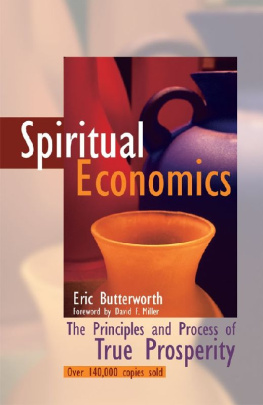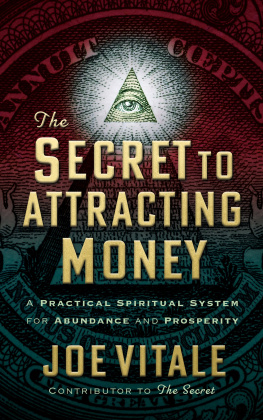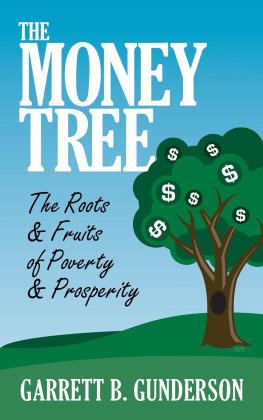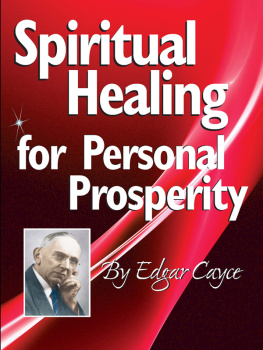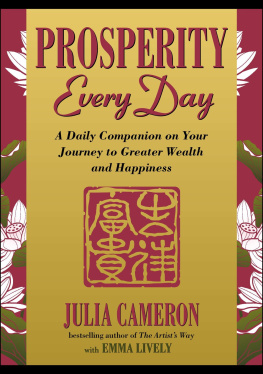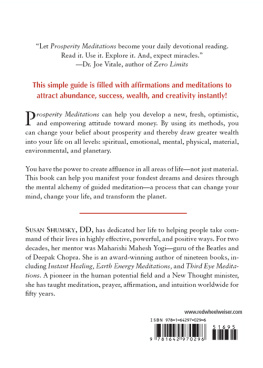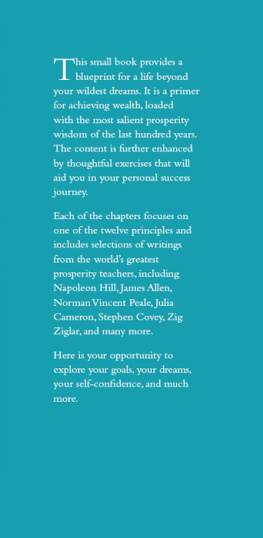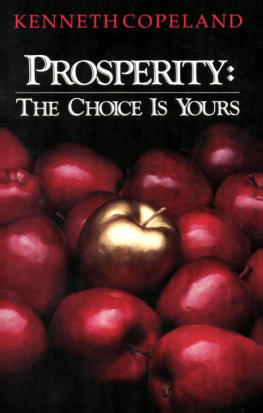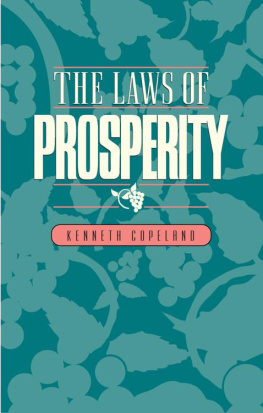
Spiritual
Economics
Also by Eric Butterworth
Discover the Power Within You
In the Flow of Life
Unity: A Quest for Life
Celebrate Yourself! And Other Inspirational Essays
Life Is for Living
Life Is for Loving
The Concentric Perspective
MetaMorality: A Metaphysical Approach to the Ten Commandments
The Universe Is Calling: Opening to the Divine Through Prayer

Second revised paperback edition 1998; Seventeenth printing 2011
Copyright O 2001 by Eric Butterworth. All rights reserved. No part of this book may be used or reproduced in any manner whatsoever without written permission from Unity Books except in the case of brief quotations embedded in critical articles and reviews or in the newsletters and lesson plans of licensed Unity teachers and ministers. For information, write to Unity Books, 1901 NW Blue Parkway, Unity Village, MO 64065-0001.
To place an order, call the Unity Customer Care Department at 1-800-6690282 or visit www.unitybooks.org .
The Revised Standard Version is used for all Bible verses, unlesss otherwise stated.
Cover design: Gretch West
Cover photo by Mark E. Gibson/RO-MA STOCK
Library of Congress Catalog Card Number: 82-50870
ISBN 978-0-87159-787-8
Canada BN 13252 0933 RT
Library of Congress Cataloguing-in-Publication Data
Butterworth, Eric.
Spiritual Economics / Eric Butterworth.p. cm.Originally published: 1993.ISBN 0-87159-269-XISBN 978-0-87159-787-81. WealthReligious aspectsUnity School of Christianity2. Unity School of ChristianityDoctrines. 3. New Thought.I. Title.[BX9890.U505B875 19971241'.68DC21 97-26302 CIP "What no eye has seen, nor ear heard, nor the human heart conceived, what God has prepared for those who love him."
1 Corinthians 2:9 NRSV
Contents
by David F. Miller
Foreword to the 1998 Edition
It is impossible to separate the experiences of our life into mutually exclusive categories in such a manner that one does not influence the other or have impact on another. Advancements in science, medicine, art, and indeed economics, all arise from the same source, the creative mind that taps into the inner Self and eventually finds expression in our actions.
The various aspects of our life are all governed by laws that, while not as easy to understand as gravity, are nonetheless as real. In addition, the laws that govern these various aspects are compatible. There is a spiritual aspect to the law that governs human behavior, whether we like it or not.
Eric Butterworth's Spiritual Economics puts in clear and concise form the laws that govern economics. These laws are not different because Mr. Butterworth terms them spiritual economics. These laws are certain regardless of the label ascribed, and they have not changed in the fifteen years since the book first appeared. You perhaps might be an agnostic. However, the results of allowing your inner thoughts to develop into an expression of action would produce the same results as those of the most devoted student, if the unfolding process were the same. Mr. Butterworth suggests that God does not have a choice, we do.
In the Sermon on the Mount, Jesus tells us that we should go the "second mile," to do more than is expected. Is this some pious, abstract, ungrounded truth? Or is this perhaps one of the clearest assertions of economic law? What could be more successful than a retailer that gives more value than is expected?
The life of my employer, Mr. Penney, serves as a wonderful example of spiritual economics in practice as well as spiritual economics aborted. For the first fifteen years of his phenomenally successful retail career, he had a vision that resulted in a retail format that was more efficient, that gave more value and service. He shared that vision, and the success of that vision, with others. His focus was on the process and parallels the steps outlined in Eric Butterworth's Spiritual Economics .
The success that Mr. Penney experienced unfortunately led to thoughts, not of service but of self-importance, of power, and yes, of greed. This willingness to succumb to the temptations of personal power had disastrous economic results, apart from the Penney Company. He found himself both economically and emotionally bankrupt at the age of fifty-seven. Living by spiritual laws had given way to a different voice. However, Mr. Penney, because of his great spiritual foundation, was able to overcome and eventually triumph over this misdirection.
The technological gains of the twentieth century have broken down barriers and have allowed a more free flow of the universal intelligence that is available to all of us. The twenty-first century will no doubt accelerate this process. It is impossible to imagine the great economic gains that come from the expansion of universal Mind through the sharing of knowledge and vision plus the willingness to let all benefit from its collective force.
Within each of us is an inner urge to live life to its fullest, and to share that fullness with others as well. Eric Butterworth has succinctly detailed the steps that are necessary to achieve this fullness. He appropriately warns that it is not the accumulation of "things," but the will to serve and share the abundant life which is available if we are willing to listen to our inner Source and to translate our inner voice into vision and action.
My personal experience confirms the truth of Eric Butterworth's message. Grabbing for the "Gold Ring" without quiet listening and affirmation generally has resulted in financial loss; however, patience and a carefully reasoned desire to serve have produced financial rewards.
Considering the historic view of human progress, we have unimaginable benefits yet to realize as co-creators in shaping the earth's unlimited bounty to the good of all.
David F. Miller
March 1997
David F. Miller is retired vice chairman of the board and chief operating officer of the JC Penney Company, Inc.
Preface
Ours is an age of great change. Great corporations are streamlining their workforce to reflect the need for greater efficiencies of operation and also for the impact of automation. Whole industries are either being eliminated entirely or are moving into new fields. The result: jobs once considered to be secure are being eliminated. Many workers are being faced with the need to undergo retraining for entry into new fields of work. Many people are launching out in entrepreneurial endeavors, calling for faith and vision and the need to tap into the universal flow of substance.
Healthful is a common word which connotes "conducive to health," that is good food, plenty of rest, and an environment of high vibrations. There is no word, however, that relates to the things that make for a personal experience of wealth and there should be. So I have taken the liberty of coining the word wealthful . It is a wonderful word. I recommend it to you. Use it often.
There is a great need to establish ourselves in those things that are conducive to prosperity. We need to turn the focus of our attention away from lack, layoffs, and limitations, and on to the omnipresence of universal substance. We can see it in the everywhere presence of life all through nature, and we can feel it in the endless flow of creative ideas that issues forth from our minds in moments of inspiration. Just as there are experiences that are healthful to us, so are there experiences that are "wealthful."
Expose yourself constantly to wealthful ideasthink prosperity, think substance, think affluence. Your life will be influenced for good or ill by the kinds of thoughts that rule your mind and manifest in your world. Spiritual Economics is all about such thoughts. I strongly recommend it to you. And supported by the testimony of scores of people who have written to tell of the positive influence on their lives of working with this book, I sincerely believe it can be a wealthful influence in your life.
Next page
